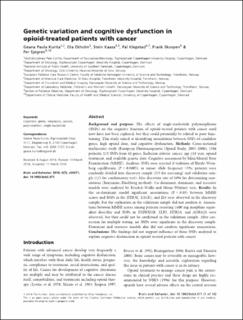| dc.description.abstract | Background and purpose
The effects of single‐nucleotide polymorphisms (SNPs) on the cognitive function of opioid‐treated patients with cancer until now have not been explored, but they could potentially be related to poor functioning. This study aimed at identifying associations between SNPs of candidate genes, high opioid dose, and cognitive dysfunction.
Methods
Cross‐sectional multicenter study (European Pharmacogenetic Opioid Study, 2005–2008); 1586 patients; 113 SNPs from 41 genes. Inclusion criteria: cancer, age ≥18 year, opioid treatment, and available genetic data. Cognitive assessment by Mini‐Mental State Examination (MMSE). Analyses: SNPs were rejected if violation of Hardy–Weinberg equilibrium (P < 0.0005), or minor allele frequency <5%; patients were randomly divided into discovery sample (2/3 for screening) and validation sample (1/3 for confirmatory test); false discovery rate of 10% for determining associations (Benjamini–Hochberg method). Co‐dominant, dominant, and recessive models were analyzed by Kruskal–Wallis and Mann–Whitney tests.
Results
In the co‐dominant model significant associations (P < 0.05) between MMSE scores and SNPs in the HTR3E, TACR1, and IL6 were observed in the discovery sample, but the replication in the validation sample did not confirm it. Associations between MMSE scores among patients receiving ≥400 mg morphine equivalent dose/day and SNPs in TNFRSF1B, TLR5, HTR2A, and ADRA2A were observed, but they could not be confirmed in the validation sample. After correction for multiple testing, no SNPs were significant in the discovery sample. Dominant and recessive models also did not confirm significant associations.
Conclusions
The findings did not support influence of those SNPs analyzed to explain cognitive dysfunction in opioid‐treated patients with cancer. | en_US |

